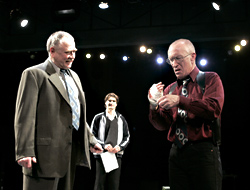Irish playwright Martin McDonagh presents a world so twisted and absurd, so riddled with cruelty and botched understanding, that it’s easy to miss his greatest gift: He’s a natural-born storyteller. He has an uncanny, seemingly innate feel for the warp and woof of narrative, and his employment of language is courageous, a force unto itself. In The Pillowman, which opened ACT’s 2006 season under the able direction of artistic director Kurt Beattie, one catches hints of McDonagh’s artistic arsenal— Beckett, Mamet, Swift, Pinter, Borges—yet the work is unique, something wholly new and exciting in contemporary theater. And if you don’t agree—well, as McDonagh might say, then feck you.
The play opens on a stark scene of interrogation: Katurian (Matthew Floyd Miller), an obscure young writer of hyper-grisly fables, is being grilled by two officials of an unnamed totalitarian government, Tupolski (Denis Arndt) and Ariel (R. Hamilton Wright). It seems that Katurian’s stories—which he cranks out by the dozens and reads aloud exclusively to his mentally challenged older brother, Michal (Shawn Telford)—may be inspiring a copycat serial murderer, some sicko given to cutting off the toes of boys and burying little girls alive. A number of these tales, including the eponymous “Pillowman,” are either narrated or re-created during the play. As the stories pile up, they crisscross and weave together, creating a deeply textured, fantastically complicated dialectic that comments upon the act of storytelling itself—its origins, its dangers, its responsibilities.
The interrogation, the backbone of the play, develops as a sort of existential nightmare, oscillating between the comical and the terrifying and pointing always toward madness. It’s never clear exactly what the cops want to know or what’s at stake, though numerous times Katurian is threatened with death. “We like executing writers,” Tupolski tells him. “Dimwits we execute every day. It sends out a signal.” Arndt and Wright are excellent as the “good cop/bad cop” tandem whose utterly arbitrary abuse of power and catch-22 logical curlicues provide the play’s finest moments. Wright brings the perfect air of jittery, bug-eyed mania to his role as a ruthless torturer. His rapid-fire barking, tense, clipped gestures, and piercing glare embody spontaneous violence. And Arndt gives the play’s best performance as the “brains” of the outfit, whose wry, distracted demeanor sways between paternal and pathological. His Tupolski, a combination of Joseph Heller’s Major Major and O’Brien from 1984, is the actual focus of the play, a man of unhinged intelligence whose allegiance to brute force is the ultimate foil to Katurian’s creative ambivalence.
Miller is good as the besieged storyteller whose tossed-off tales of degradation and hurt have gotten him in way over his head. As Katurian’s dim brother, Telford puts a little too much banality in a role that calls for equal parts innocence and evil. There are moments when the Baby Huey act flies over the top, and Michal’s squeaky voice and slack stare wax cartoonish rather than appropriately pathetic. In his subtler moments, however, he gives just the right blend of childlike hope and idiot menace.
All in all, this is a powerful, jarring production that honors the fearless assault of McDonagh’s storytelling. The hydraulic stage, which raises and lowers to reveal nicely uncluttered sets, is ingeniously deployed, and the music is spare and creepy. Director Beattie should be commended for hewing close to the script and allowing the full flow of McDonagh’s hard, violent language. The Pillowman is strong medicine—even if some folks find it to be ipecac, they won’t be able to stop talking about it.








